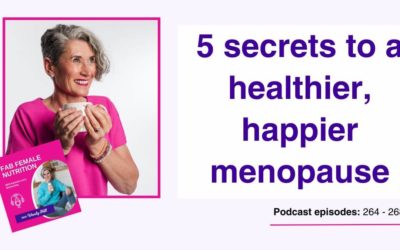The term perimenopause has been in use since the 1960’s but it has become more common in recent years. We often use the term perimenopause and menopause interchangeably, but if we are being medically correct menopause is the day that you have not had a period for 12 months. Perimenopause is the time from when you start to experience hormonal changes until menopause, this is different for everyone but generally lasts about ten years.
It is important to understand that everyone has a different perimenopause journey, but the more we understand about it the easier our journey will be.
When does perimenopause start?
This is the key question! Everyone is different, for most it is in our early 40’s, but it can be earlier or later. We all entered puberty at a different time, and perimenopause is similar. Your journey will be different to mine, or your friends. However, it is useful to talk to other females in your family, as you share genes, your passage through perimenopause is likely to be similar.
The main thing to understand is that you can be in perimenopause and experiencing symptoms whilst still having regular periods. And you don’t need to wait until you experience symptoms, the earlier you start to prepare the easier your perimenopause transition will be.
What can you do to balance hormones?
There are lots of simple things that you can do at any age to help balance your hormones. This will support your health regardless of whether you have started the perimenopause or not:
- Reduce Stress – your body produces cortisol in reaction to stress. When your body is making cortisol, it can’t make progesterone so levels drop. Lower levels of progesterone drive perimenopause symptoms, and so reducing stress can reduce your perimenopause symptoms.
- Healthy Diet – insulin management is key in menopause and our modern diet that is high in processed food and low in vegetables, fruit and fibre are not supportive of this. Eating a diet rich in vegetables and fruit, healthy protein and good quality fats is the best way to support your health at any time of life.
- Movement – note I didn’t put exercise, as moving more daily is more beneficial than doing a HIIT class each morning and then sitting on your backside all day. Movement helps our body’s detoxification and will release positive hormones known as endorphins. Endorphins not only improve your mood they also help block pain receptors.
What is happening to our hormones in perimenopause?

During a normal cycle our oestrogen levels rise and when they are at a high enough level they signal the release of the egg in anticipation of fertilisation. After ovulation the egg releases progesterone (and a little bit of oestrogen). If the egg is not fertilised it breaks and stops producing both hormones and when the levels are low enough it signals a shedding of the womb lining. Your bleed is day 1 of your period and so the cycle repeats.
When we approach perimenopause anovulatory cycles become more common. Anovulatory means that we do not release an egg. Your cycle may appear the same, but your hormone levels will not be the same as the egg is not releasing progesterone. Progesterone promotes stable moods, reduces anxiety and promotes restful sleep.
Then to compound this, our oestrogen starts to have a mind of its own. It stops following its regular cycle and behaves like it did in our puberty. It is this imbalance of hormones that causes many of the symptoms associated with menopause, including some that you may not have considered.
What are the signs and symptoms of perimenopause?
There are thought to be up to 70 different symptoms that are associated with perimenopause, and many of them have nothing to do with your period and your cycle. You may be experiencing changes in your levels or progesterone and oestrogen, but your cycle is still regular. Many women find that they have been misdiagnosed with conditions such as depression or fibromyalgia, when infact their symptoms are linked to the early stages of perimenopause.
I am going to focus on a few key symptoms that are either misdiagnosed, or have medical interventions that might not be beneficial to our health, or a healthy menopause journey.
To help you work out if you are in perimenopause download my symptom tracker. You can use this to approach your GP or health practitioner to have a better conversation about perimenopause.
Anxiety and/or Depression in mid life.
I meet many women who appear to be very calm and collected on the outside. They often have a young family, a successful career and what appears to be a dream life. Then suddenly they begin to feel anxious or depressed and they cannot understand why. They don’t want to admit it to their family and friends because they feel they wont understand but they just can’t put their finger on why they are not feeling as happy as they were.
And they might have contacted their GP, and often have been prescribed antidepressants. Often they are reluctant to take medication but they don’t know what else to do. This is extremely common.
If we are having cycles without releasing an egg it means that we are not getting any progesterone. Progesterone is key in improving our mood. The irritability you used to feel when you had PMS for a few days before your bleed are due to the low levels of progesterone at that time. But now you are experiencing those low levels throughout the month. This can lead to unexplained mood swings that seem out of your control.
And lets not forget oestrogen, whose levels fluctuate during perimenopause. Oestrogen plays a key role in increasing levels of serotonin. Serotonin is inextricably linked to our mood. Most prescription antidepressant are selective serotonin re-uptake inhibitors (SSRi’s). They block the re-uptake of serotonin in our cells meaning there is more available in the body. As our oestrogen levels fluctuate perimenopause feelings of anxiety and low mood are not surprising.
Aching joints in mid life.
Women are ten times more likely to be diagnosed with fibromyalgia than men, and the most common age to be diagnosed is in 35-45. Just as we enter the perimenopause.
Research led by Australia’s University of Tasmania and Monash University published in the journal Osteoarthritis and Cartilage found that women with low serum levels of oestrogen and progesterone had increased knee swelling-synovitis and possibly other osteoarthritis-related structural changes.
I often hear women complaining that they feel like they have aged overnight. That they find it difficult to exercise like they used to, or they wake with aches and pains. The aches and pains that many women start to experience in their early 40’s might be attributed to our hormonal changes.
Poor quality sleep in perimenopause
Sleep is key to energy and repair. Poor quality sleep affects us in many ways and if it continues over several months it can lead to increased inflammation, poor gut health and fatigue.
Lower levels of progesterone are contributing to poor quality sleep? How do we know this? If you are prescribed progesterone replacement therapy your practitioner will advise you to take it before bed – because progesterone has a sedative effect.
Poor quality sleep can be contributing to poor gut health, that can be affecting our serotonin, which affects our mood. Which is why perimenopause and supporting ourselves through this time is multi level and complex.
Bringing it all together
Not everyone will experience all of the symptoms of perimenopause. About 20% sail through the transition without noticing any changes. But for many of us the symptoms start well before we even start to think about ‘the change’.
Having the knowledge to understand what you might expect, and to seek advice is key in supporting your health throughout this transitional period. Looking after yourself and being kinder to yourself are key. Rather than pushing yourself to do the same as you did in your 20’s and 30’s respect the fact that your body is experiencing changes.
Making small changes to your diet and lifestyle can significantly impact your overall health and your journey through the perimenopause, menopause and beyond.

What can you do if you are experiencing symptoms?
So know you know how your fluctuating hormones in early perimenopause can drive many different symptoms, that can often be misunderstood and misdiagnosed.
And if you decided to approach your GP make sure you are now able to talk to them about perimenopause and discuss your symptoms from a place of knowledge, use my symptom tracker to help you. Ask them to consider all your sex hormones (oestrogen, progesterone and testosterone) as contributing factors, and ask them to test for potential low vitamin and mineral levels, which can also affect your mood and energy. You may need to give them time to do some research, but be patient and be confident in your knowledge.
What else can you do to support your perimenopause journey?
Why not join my amazing free community for women Fabulous & Female community. As an expert in nutrition and the impact on female hormones I’ll help you understand what to expect on your journey through perimenopause and beyond. Not only will you be able to get advice from me, you will be supported by all the other members who are going through the same thing.
It is a period of change and fluctuation. Take things at your own pace, make changes where needed and remember that post menopause your hormones will settle down and calm will be restored.




